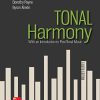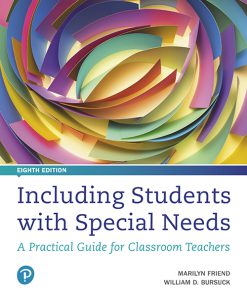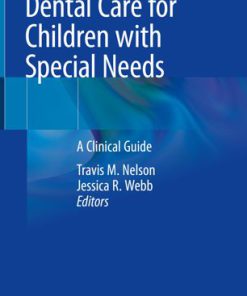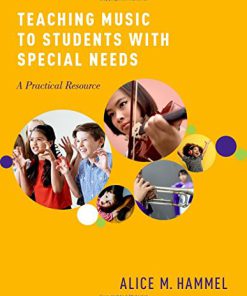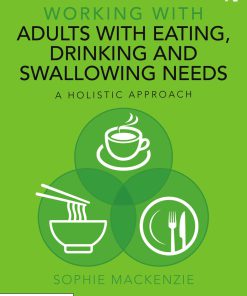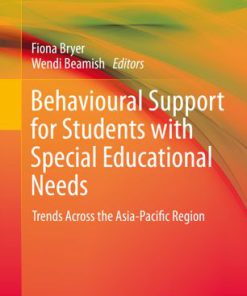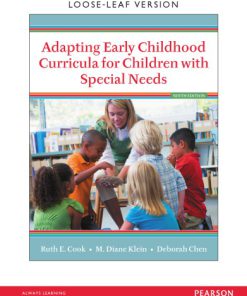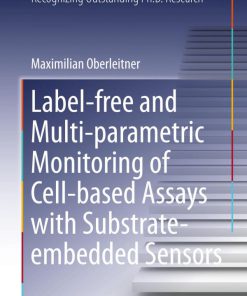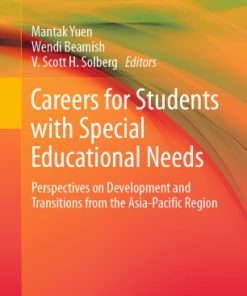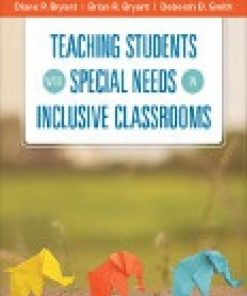Teaching music to students with special needs a label-free approach 2nd Edition by Alice Hammel, Ryan Hourigan 0190654719 9780190654719
$50.00 Original price was: $50.00.$25.00Current price is: $25.00.
Teaching music to students with special needs : a label-free approach 2nd Edition by Alice M. Hammel, Ryan M. Hourigan – Ebook PDF Instant Download/DeliveryISBN: 0190654719, 9780190654719
Full download Teaching music to students with special needs : a label-free approach 2nd Edition after payment.
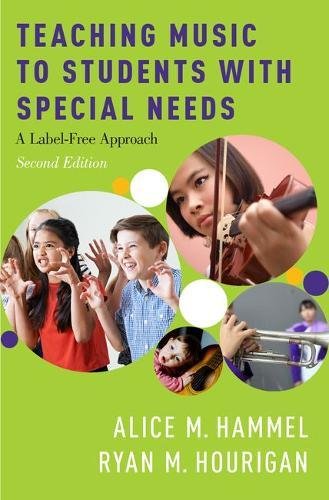
Product details:
ISBN-10 : 0190654719
ISBN-13 : 9780190654719
Author: Alice M. Hammel, Ryan M. Hourigan
The Second Edition of Teaching Music to Students with Special Needs offers updated accounts of music educators’ experiences, featured as vignettes throughout the book. An accompanying Practical Resource includes lesson plans, worksheets, and games for classroom use. As a practical guide and reference manual, Teaching Music to Students with Special Needs, Second Edition addresses special needs in the broadest possible sense to equip teachers with proven, research-based curricular strategies that are grounded in both best practice and current special education law. Chapters address the full range of topics and issues music educators face, including parental involvement, student anxiety, field trips and performances, and assessment strategies. The book concludes with an updated list of resources, building upon the First Edition’s recommendations.
Teaching music to students with special needs : a label-free approach 2nd Table of contents:
Part I The Current Landscape of the Special Education System in the United States
Chapter 1 Public School Education within a Democracy: An Equal Opportunity for All Students
Unequal Opportunity
A Brief Look at Special Education in the 21st Century
Funding of Special Education: A Demographic Snapshot of Support
Family Challenges and Children with Disabilities
Teaching Music in the 21st Century: A Label-Free Approach to Teaching Music to Students with Special Needs
Cognition
Communication
Receptive and Expressive Language
Language and Culture
Behavioral Challenges
Emotional Challenges
Sensory Needs
Physical and Medical Conditions
Conclusion
Discussion Questions
Chapter 2 The Current Structure of Special Education in Our Schools: A Brief History of Legislation and Litigation in the United States
Keystone Legislation and Educating Students with Special Needs
Public Law 94–142
Legislative History on Behalf of Students Who Are Intellectually Gifted
The Jacob K. Javits Gifted and Talented Students Education Act
More Recent Legislation and Litigation Regarding Students with Special Needs
IDEA and Early Intervention
The Six Principles of IDEA: Implications for Music Educators
Zero Reject
Nondiscriminatory Evaluation
Free and Appropriate Education
Least Restrictive Environment
Procedural Due Process and Parental Involvement
The Americans with Disabilities Act
Responsiveness to Intervention
The Effect of the No Child Left Behind Act on Special Education
Race to the Top
The Every Student Succeeds Act (2015)
Common Core State Standards (2010)
Applications and Considerations for Music Educators
Discussion Questions
Part II Preparing to Teach Music to Students With Special Needs
Chapter 3 Preparing to Teach: Fieldwork and Engagement Opportunities in Special Education for Preservice and In-Service Music Educators
Becoming Acquainted Through Observation, Assisting, Discussion, and Planning
Types of Fieldwork Opportunities in Special Education for Preservice and In-Service Music Educators
Fieldwork in Self-Contained Classrooms
Fieldwork Resource Rooms
Fieldwork in Inclusive Classrooms
Fieldwork in Summer Enrichment Programs
Fieldwork in Specific Therapy Environments
Music Therapy and Music Education
Creating Fieldwork Experiences with Students with Special Needs for Preservice Music Educators
Conclusion
Discussion Questions
Chapter 4 A Resourceful and Pedagogical Approach to Teaching Students with Special Needs
Participation in the Process and Gathering Support
Speaking with Special Education Professionals and Staff
Parent Partnerships
Individualized Education Programs and 504 Plans
Transition Plans
504 Plans
Attending the IEP or 504 Meetings
Understanding Adaptations, Accommodations, and Modifications
Incorporating the Six Domains Into Classroom Accommodations
Teaching Music to Students with Cognitive Challenges
Teaching Music to Students with Communication Challenges
Teaching Music to Students with Behavioral Challenges
Teaching Music to Students with Emotional Challenges
Teaching Music to Students with Physical and Medical Conditions
Putting It All Together
Discussion Questions
Part III Practical Classroom Adaptations, Modifications, and Assessment Techniques for Teaching Students With Special Needs in the Music Classroom
Chapter 5 Developing a Student-Centered and Inclusive Music Classroom
Classroom Management and Students with Special Needs: Four Important Considerations
Close Supervision and Monitoring
Classroom Rules
Opportunities to Respond
Contingent Praise
Initial Preparation and Planning
Continued Communication
Physical Arrangement
Parents and Classroom Behavior
Anxiety
Moderate Intervention Plans
School-Wide Positive Behavior Support Systems
The Socialization of Students with Special Needs
Theoretical Framework for Socialization and Inclusion
Caring: A Feminine Approach to Ethics and Moral Education
Social Identity Processes in Organization Contexts
Risks (Lessons Learned From Vygotsky)
Practical Strategies for Music Educators
Be Aware of the Social Environment in Your School
Synergy
A Moral/Ethical Code
Be Proactive in Your Approach to Socialization
Conclusion: Critical Issues for Students with Special Needs
Discussion Questions
Chapter 6 Curriculum and Assessment for Students with Special Needs
Fundamentals of Curriculum Design and Students with Special Needs (A Quick Review)
Constructivism as a Curricular Model to Assist with Inclusion
Four Primary Teaching Practices to Consider When Teaching Students with Disabilities in a Modified or Adapted Curriculum
Modality
Pacing
Size
Color
Curricular Modifications in Music Education for Students with Disabilities
Creating
Performing
Responding
Connecting
Assessment and Students with Special Needs
Measurement, Assessment, and Evaluation for Students with Disabilities
Formative Assessments for Students with Special Needs
Elementary
Beginning Band
Beginning Choir
Beginning Orchestra
Secondary Instrumental
Secondary Choral Music
Writing Clear, Obtainable Objectives for Students with Special Needs
Seventh-Grade Choir
Assessing Nonmusical Goals
High School Orchestra
Alternative Assessments for Students with Special Needs
Summative Assessments and Students with Special Needs
Conclusion
Discussion Questions
Chapter 7 Teaching Strategies for Performers with Special Needs
The Hidden Curriculum in Traditional Performing Ensembles (Equal Access)
Participating in the Special Education Process
Understanding the Disability (Seeking Resources)
Adaptation of Instruction for Performers with Special Needs
The Use of Technology
Large Group Performing Ensembles: Are They the Appropriate Placement for Students with Special Needs?
Meaningful Participation
Alternative Models of Performance for Students with Exceptionalities
Conclusion
Discussion Questions
Chapter 8 Teaching Music to Students Who Are Intellectually Gifted
Intellectual Giftedness in the Music Classroom
Understanding the Spectrum of Special Needs (Gifted and Talented)
A Brief Background of How Students Are Identified as “Gifted”
The Current Identification Process
Individual IQ Testing and Other Identification Practices
Categories of Giftedness
Highly/Profoundly Gifted
A Discussion of Variant Needs and Services Provided to Students with Special Needs
Elitism Versus Egalitarianism
Characteristics of Students Who Are Gifted
Behavior
Learning
Creativity
Emotion
General Intellectual Ability
Specific Academic Aptitude
Instructional Delivery/Pacing/Process/Modifications
Grouping Options
Teacher Characteristics That Are Successful When Teaching Students Who Are Gifted
Twice Exceptional
Putting It All Together
Conclusion
Discussion Questions
Part IV Resources for Music Educators
Chapter 9 Resources for Music Teachers and Music Teacher Educators Regarding Teaching Students with Special Needs
Internet Resources Pertaining to Persons with Autism
Internet Resources Pertaining to Students with Sensory Challenges
Specific Visual Impairment Internet Resources
Specific Hearing Impairment Internet Resources
Internet Resources Pertaining to Persons with Developmental Delays
Internet Resources Pertaining to Persons with Emotional Disturbances
Internet Resources Pertaining to Persons with Cognitive Disabilities
Multiple Impairment Internet Resources
Internet Resources for Children with Physical Disabilities
Internet Resources for Persons or Students with Chronic Medical Conditions
Internet Resources for Students with Specific Learning Disabilities
Speech and Language Impairment Internet Resources
Internet Resources Pertaining to Persons with Traumatic Brain Injury
Selected Research within Music Education Pertaining to Students with Special Needs
Dissertations within Music Education
Selected Research within General Education
Books within Music Therapy and Music Education
Selected Books within General Education
Practitioner Articles within Music Education
People also search for Teaching music to students with special needs : a label-free approach 2nd:
how to teach music in school
music activities for special needs students
teaching music to children with special needs
music lesson plans for special needs students
music lessons for special needs
Tags: Teaching music, students, special needs, Alice Hammel, Ryan Hourigan
You may also like…
Education Studies & Teaching - Special Education
Including Students with Special Needs 8th Edition Marilyn Friend
Arts - Music
Teaching music to students with special needs : a practical resource 1st Edition Alice Hammel
Uncategorized
Uncategorized
Education Studies & Teaching - Special Education
Adapting Early Childhood Curricula for Children with Special Needs Ninth Edition Ruth E. Cook
Education Studies & Teaching - School Education & Teaching
Education Studies & Teaching - Education - General & Miscellaneous


